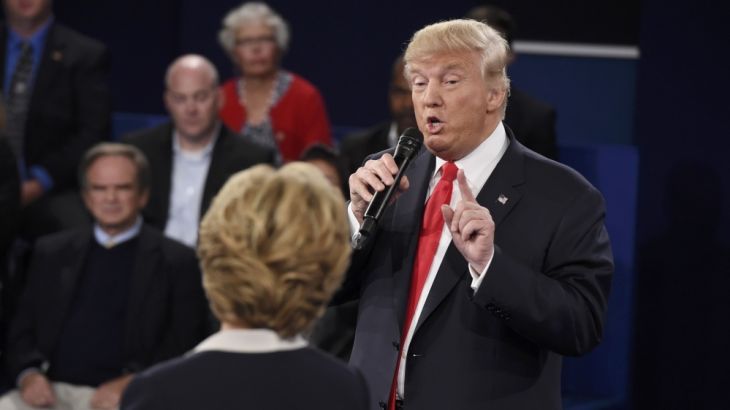What next, after a presidential campaign of insults?
The election of 1860 triggered the Civil War. In 2016 Donald Trump says he will accept the result, if he wins.

Once the last campaign speeches are made, and the final votes are counted, what then?
The United States will have a new president-elect but, after a corrosive campaign, will the American people easily accept the outcome?
Keep reading
list of 4 itemsChad’s Mahamat Deby confirmed as winner of disputed presidential election
Why are protests against France raging in New Caledonia?
South Africa’s Ramaphosa signs health bill weeks before election
A key part of the answer lies with Donald Trump. He has refused to say whether he’ll concede if he loses. In fact, he said he’ll accept the results of what he has denounced as a “rigged” system “if I win”.
“If for example he refuses to concede if he is to lose the election, then what does that mean in terms of the norms of how you participate in politics?” University of Nevada political science Professor David Damore asks.
The US has been through plenty of nasty elections in its 240 year history – including some involving the revered Founding Fathers.
In 1800, Thomas Jefferson’s hired propagandist slandered incumbent John Adams as, quote, “a hideous hermaphrodite”.
A racist leaflet from Adams’ team blasted Jefferson as “a mean-spirited … fellow, the son of a half-breed Indian squaw”.
In the complex and bitterly contested election 1860, Stephen Douglas called his opponent Abraham Lincoln a “horrid-looking wretch” with an “ungainly mass of legs and arms and hatchet face”.
But when Lincoln won, Douglas was gracious in defeat, telling his former opponent.
“Partisan feeling must yield to patriotism. I’m with you, Mr President, and God bless you.”
READ MORE: Understanding Trump’s candidacy
After all the insults and intense partisanship in the current election, how can the US restore some kind of civil discourse?
To get some fresh thinking about these issues, we went back to school. Specifically to an ethics and decision-making class at the University of Southern California.
We met a roomful of sharp students. They were led in a freewheeling discussion by Price School of Public Policy Professor Ali Abbas.
“Do you feel that some of the actions or words or thoughts you have heard in the campaign were unethical?” Abbas asked.
Max Zellner, a student from Germany, said he’d been watching the race closely.
“I feel like this presidential race was so divided along racial lines, and I was so upset that no presidential candidate was trying to create a sense of unity”, Zellner said.
Elizabeth Prosch agreed, adding that many of her friends are suffering from election fatigue. “A lot of people are really disillusioned right now, and that’s really hard to overcome.”
Student Robert Cudd believes “The biggest problem is that we are going to have to deal with this afterwards. It’s not only that we’ve had this bloody awful stressful election cycle. People have been experiencing very different realities. We’ve reached a point where we are very, very far apart from one another.”
In the class discussion, Prosch had the last – and perhaps most unsettling – word.
“I can’t see us continuing to live this way without something happening,” she said, “either in an apocalyptic setting where we divide as a country completely, or we find a way to unite.”
Remember that election of 1860? It triggered the Civil War. Of course, that couldn’t happen now … could it?